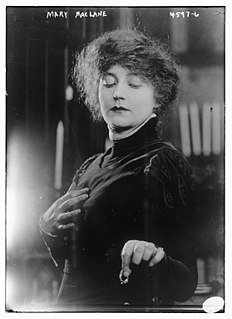A Quote by Mary MacLane
The book, you understand, was not written for publication. It was the portrayal of my emotions, the analysis of my own soul life during three months of my nineteenth year. I wrote then all the time, just as I do now, but, though the book is in diary form, it is not a diary.
Related Quotes
Keep a diary, but don't just list all the things you did during the day. Pick one incident and write it up as a brief vignette. Give it color, include quotes and dialogue, shape it like a story with a beginning, middle and end—as if it were a short story or an episode in a novel. It's great practice. Do this while figuring out what you want to write a book about. The book may even emerge from within this running diary.
Writing a diary every evening before going to bed is a good habit. We can record in the diary how much time we have devoted to our spiritual practice. The diary should be written in a way that helps us see our mistakes and correct them. It should not be a mere document of other peoples' faults or our daily transactions.
Before I wrote The Power of Now, I had a vision that I had already written the book and that it was affecting the world. I had a sense there was already a book somehow in existence. I drew a circle on a piece of paper and it said "book." Then I wrote something about the effect the book had on the world, how it influenced my life and other people's lives, and how it came to be translated into many languages affecting hundreds of thousands of people.
Books are just dead words on paper and it is the readers who bring the stories alive. Previously, writers wrote a book and sent it out into the world. A couple of months after publication letters from readers might arrive. And, leaving aside the professional reviews, it is really the reader's opinions that the writer needs. They vote for a book - and a writer - with their hard earned cash every time they go into a bookstore (or online - that's my age showing!) and buy a book.
'Diary of a Wimpy Kid' is my first book, and it's the fulfillment of a life-long dream. I had always wanted to be a cartoonist, but I found that it was very tough to break into the world of newspaper syndication. So I started playing with a style that mixed cartoons and 'traditional' writing, and that's how 'Diary of a Wimpy Kid' was born.
Richard wrote a mental diary in his head. Dear Diary, he began. On Friday I had a job, a fiance, a home, and a life that made sense. (Well, as much as an life makes sense). Then I found an injured girl bleeding on the pavement and I tried to be Good Samaritan. Now I've got no fiance, no home, no job, and I'm walking around a couple of hundred feet under the streets of London with the projected life expectancy of a suicidal fruit fly.
There's a disciplined erotic component to it, so that the height of sexual contact is the embrace, the modest touch, a relatively chaste kiss. An important passage from the surviving 1942 diary (one I quote in the book) relates this mode of sexual expression to his own life. Mann had returned to his diary for 1927 (one of those he burned) and to his parting from the young man, Klaus Heuser, whom the family had met on holiday and invited to Munich.
Each of my books has taken me a different length of time to write - eight months for 'Seesaw Girl,' eight months for 'Shard,' three years for 'When My Name Was Keoko!' The publisher takes another year and a half to work on the book, so altogether each book can take up to three or four years to publish.





































